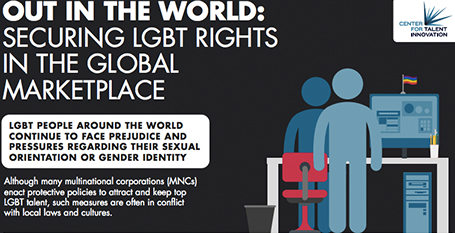The Center for Talent Innovation (CTI) studied multinational corporations in 10 different markets to see how they foster an inclusive and safe environment for employees both in and out of the workplace in .
Although 58% of LGBT employees at multinational corporations trust in their company’s non-discrimination policies, companies struggle to provide this equality in some of the world’s markets.
The report, co-authored by legal scholar Kenji Yoshino and CTI Founder and President Sylvia Ann Hewlett, surveyed 1,964 LGBT professionals and 10,242 non-LGBT professionals across Brazil, China, Hong Kong, India, Russia, Singapore, South Africa, Turkey, the UK, and the US.
It states that a company’s pro-LGBT stance attracts both more consumers and talented employees: 72% of respondents who self-identify as LGBT allies said they are more likely to accept a job at a company that supports equal opportunities for LGBT employees and 82% of ally respondents and 71 percent of LGBT individuals say they are more likely to purchase a good or service from a company that supports LGBT equality.
“Societies and organizations need to awaken to the moral and market costs of asking LGBT individuals to convert, pass, or cover,” says Kenji Yoshino, the Chief Justice Earl Warren Professor of Constitutional Law at New York University. “Only when LGBT individuals feel free to live as openly as their straight or cisgendered colleagues can we say that LGBT equality has been achieved.”
Titled Out in the World: Securing LGBT Rights in the Global Marketplace, the report grouped the countries investigated into the categories of hostile, unfriendly and friendly to LGBT.
The report highlights three models that companies adopt when operating in unfriendly or hostile jurisdictions:
- The “When in Rome” model, in which companies adhere to the norms and local laws of the jurisdiction, but allow employees to opt-out of placement there.
- The “Embassy” model, in which companies enforce pro-LGBT policies in the workplace but do not seek to effect change outside their walls.
- The “Advocate” model, in which companies seek to change cultural attitudes outside the workplace.
Watch below an extract from CTI’s Out in the World conference that took place in Davos in February last year.

